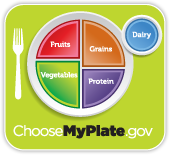Don’t just take your vitamins, eat your vitamins! When deciding what to eat or drink, choose foods and beverages that are full of nutrients like vitamin A, vitamin C, vitamin D, and zinc. Vitamins and minerals are natural components of a healthy diet and essential for a strong immune system. The immune system is a network of cells, tissues and organs that protect the body from infections and disease.
The immune system is a key component to our body’s defense against illness – however, it is not invincible, nor can it always do the work alone. By providing your body with essential vitamins, minerals, and other nutrients it needs you are better equipping your immune system to fight off infections and illnesses such as COVID-19.
Vitamin A is a fat-soluble vitamin that supports normal vision, reproduction, and the immune system. Vitamin A is not made by the body and therefore should be included in your diet. Food sources include beef liver, salmon, sweet potatoes, carrots, spinach, cantaloupe, mangoes, and fortified milk.
Vitamin C is a water-soluble vitamin that is needed for tissue growth, tissue repair, wound healing, and a healthy immune system. Like vitamin A, vitamin C is not made by the body so food sources should be included in your diet. These sources include oranges, kiwi, mango, pineapple, strawberries, blueberries, watermelon, brussels sprouts, broccoli, cauliflower, green peppers, cabbage, spinach, sweet potatoes, white potatoes, tomatoes, winter squash, some cereals, and other foods fortified with vitamin C.
Vitamin D is a fat-soluble vitamin and is important in calcium absorption, muscle function, nerve function and in helping the immune system fight off bacteria and viruses. Although the body makes vitamin D when your bare skin is exposed to the sun, it does not make enough, which is why food sources should be included in the diet. These sources include salmon, tuna, trout, mackerel, beef liver, egg yolks and cheese. Most of the vitamin D in our diets, however, come from fortified foods that include milk, soy milk, almond milk, oat milk, breakfast cereals and some brands of yogurt and orange juice.
Zinc is a trace mineral and only needed in small amounts. It is important for cell division, cell growth, wound healing, sense of taste, sense of smell and a properly functioning immune system. Food sources include pork, beef, chicken, lamb, fish, legumes, whole grains, pumpkin seeds, sunflower seeds, pine nuts, cashews, pecans, almonds, and chia seeds.

You can now put this guidance into practice and create a plate loaded with vitamins and minerals. MyPlate will show you how to include a variety of nutritious foods in your diet to help you make healthy food and beverage choices. To find new ways to prepare healthy foods, explore MyPlate kitchen a source that offers recipes and resources to further support a healthy diet. Want to know more about the vitamin and mineral content of food? Search the United States Department of Agriculture FoodData Central.
Taking the right vitamins will not prevent you have contracting a virus or other illness, however it may provide your body with added support for a healthier immune system. minerals cannot guarantee the prevention of illness or infection, but it certainly can give your body the additional support it needs to help fight against pathogens that attack it. As we continue this series, discover other ways to support your immune system, get active, and LIVE COVID SMART!
The Live COVID SMART blog series was developed to promote resilience in response to the COVID-19 pandemic. Contributing authors: Kim Griffin, Beth Kerr, Lori Wiggins, Marcia Brown, Heidi Radunovich, John Diaz, and LaToya J. O’Neal. This work is supported by the Rural Health and Safety Education Program [grant no. 2021-46100-35459].
References
U.S Department of Health & Human Services. National Institutes of Health. Office of Dietary Supplements Website. Vitamin A. https://ods.od.nih.gov/factsheets/VitaminA-Consumer/ . Accessed November 1, 2021.
U.S Department of Health & Human Services. National Institutes of Health. Office of Dietary Supplements Website. Vitamin C. https://ods.od.nih.gov/factsheets/VitaminC-Consumer/ . Accessed November 1, 2021.
U.S Department of Health & Human Services. National Institutes of Health. Office of Dietary Supplements Website. Vitamin D. https://ods.od.nih.gov/factsheets/VitaminD-Consumer/. Accessed November 1, 2021.
U.S Department of Health & Human Services. National Institutes of Health. Office of Dietary Supplements Website. Zinc. https://ods.od.nih.gov/factsheets/Zinc-Consumer/ . Accessed November 1, 2021.
U.S. Department of Agriculture. MyPlate.gov Website. Washington, DC. MyPlate. https://www.myplate.gov/ Accessed November 1, 2021.
U.S. Department of Agriculture. MyPlate.gov Website. Washington, DC. MyPlate Kitchen. https://www.myplate.gov/myplate-kitchen. Accessed November 1, 2021.
U.S. Department of Agriculture. FoodData Central Website. Washington, DC. FoodData Central. https://fdc.nal.usda.gov/ . Accessed November 1, 2021.
 0
0
